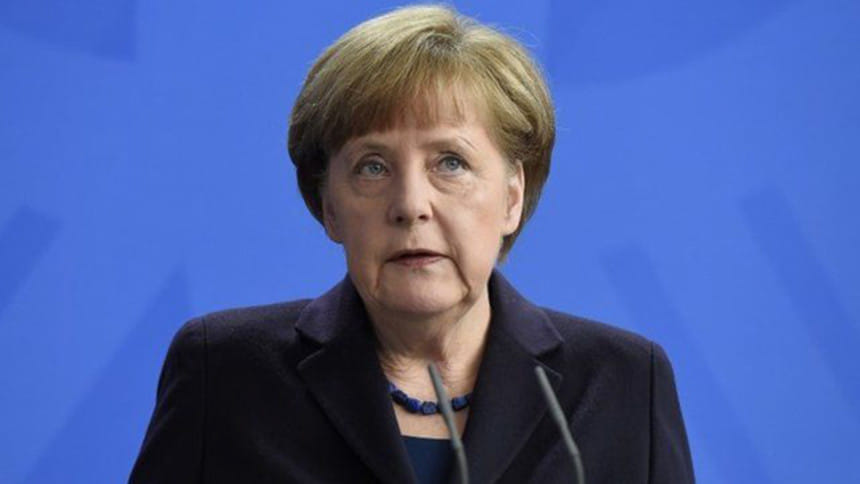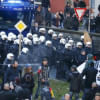Merkel proposes tougher migrant laws

German Chancellor Angela Merkel has proposed changes to make it easier to deport asylum-seekers who commit crimes, after the New Year's Eve sex attacks on women in Cologne.
The attacks, which victims say were carried out by men of North African and Arab appearance, have called into question her open-door migrant policy.
The police's handling of the events has also been sharply criticised.
The anti-immigrant Pegida movement is due to protest in the city.
Merkel, speaking after a meeting of her party leadership in Mainz, proposed excluding the right of asylum for those who have committed crimes, including those given probation.
"When crimes are committed, and people place themselves outside the law...there must be consequences," she told reporters after the meeting.
The move, which will still need parliamentary approval, follows the New Year's Eve attacks, which sparked outrage in Germany.
Victims described chaos as dozens of sexual assaults and robberies were carried out with little apparent response from the authorities around the city's main station.
Twenty-one people are being investigated for sexual assault.
Merkel under pressure - BBC's Anna Holligan in Cologne
Angela Merkel's challenge is to reassure an increasingly pessimistic public that she has a long-term plan. The Chancellor showed compassion when she welcomed more than a million refugees and migrants into Germany in 2015. Now she must make it clear there are limits to German tolerance.
Anti-immigration campaigners have seized on the Cologne incident as an example of what they see as the failure of the country's asylum policy. The prominence of the far-right Pegida movement was fading. It is now using the attacks as a propaganda tool.
On the other side of what is a widening chasm, established Islamic groups here have expressed fears that the actions of a few may jeopardise the future of many.
With tension rising and tolerance waning, Germany's doors remain open, but many here are increasingly asking, for how long and at what cost?
Officials from Angela Merkel's conservative Christian Democrat party are expected to propose that migrants jailed for any length of time should face deportation.
Under current German laws, asylum seekers are only forcibly sent back if they have been sentenced to at least three years, and providing their lives are not at risk in their countries of origin.
"I think there are indications that changes must happen," Merkel said.
"The interior minister and the justice minister are discussing just what we could improve," she added.
The party leadership is holding a policy meeting in the city of Mainz.
The identification of the attackers in Cologne as North African or Arab in appearance has caused alarm in Germany because of the influx of more than a million migrants and refugees in the past year.
Meanwhile German officials have warned that anti-immigrant groups have been trying to use the attacks to stir up hatred.
Similar attacks to those seen in Cologne were also reported in Hamburg and in Stuttgart on New Year's Eve. In Bielefeld, hundreds of men tried to force their way into nightclubs Die Welt reports (in German).
Police said several women had alleged sexual assault.
As the investigation into the Cologne attacks continues, federal authorities say they have identified 18 asylum-seekers among 31 suspects. But they are suspected of theft and violence, but not sexual assault.
The suspects include nine Algerians, eight Moroccans, four Syrians, five Iranians, two Germans and one each from Iraq, Serbia and the US.
Separately to the federal investigation focusing on what happened at the station itself, Cologne police are investigating 21 people in connection with the sexual assaults. It is not known how many of these are asylum seekers.
The North Rhine-Westphalia state police have recorded 170 complaints of crimes, 117 of which involve sexual assault. There were two allegations of rape.
The interior minister of North Rhine-Westphalia, Ralf Jaeger said on Friday that he had suspended police chief Wolfgang Albers from his duties.
He has been accused of holding back information about the attacks, in particular about the origin of the suspects.

 For all latest news, follow The Daily Star's Google News channel.
For all latest news, follow The Daily Star's Google News channel. 








Comments